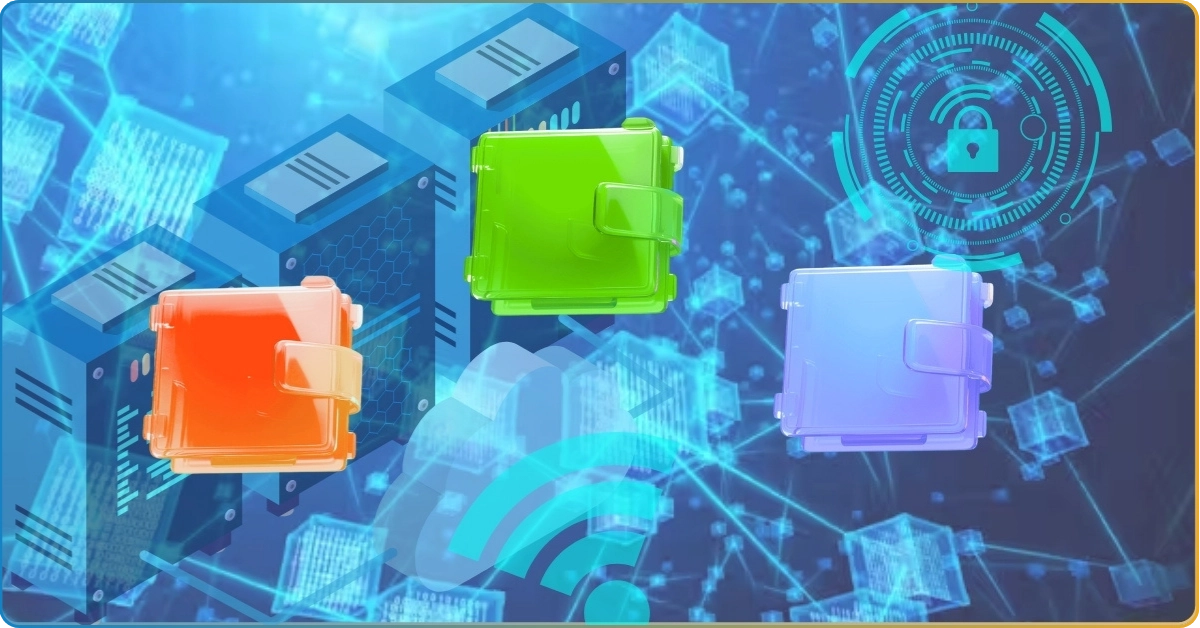If you are looking to invest in digital assets, it’s important to choose a secure and user-friendly way to store them.
Enter private keys—cryptographic hashes that provide secure access to your cryptocurrencies. Storing these keys can be done in several ways, depending on the level of security, ease of use, and immediacy of access.
One of these ways involves cryptocurrency wallets. You can choose among three types: cold wallets, warm wallets, or hot wallets.
Not sure which option is the best for you and your organization? This TRU Insight takes a closer look at these types of crypto wallets and their respective benefits.
An Overview: What is a Crypto Wallet?
Cryptocurrency is not stored on exchanges or in wallets. Instead, they live on a blockchain.
While wallets do not store coins, they hold private keys that unlock them on the blockchain.
Private keys are used to validate ownership of coins. They allow you to send, receive, and access crypto.
Without cryptocurrency wallets, you won’t be able to control your crypto.
Learn more: Cold, Warm, or Hot: Three Types of Cryptocurrency Wallets – TradersUnited
Understanding the Different Crypto Wallets
Cryptocurrency wallets differ depending on their internet connectivity and the way they manage your assets.
Before you determine which one is the right choice for you, our experts have laid out some fundamentals to help you understand how each one works.
Crypto Hot Wallets
A hot wallet is a crypto wallet directly connected to the internet. For this cryptocurrency wallet, you need online private keys to sign transactions.
You can automate the creation and recording of transactions on the blockchain without needing human intervention.
Unlike cold wallets, a hot wallet allows users to quickly and easily trade their assets. However, it can be more vulnerable to theft if the private key’s security is compromised. This is because hot wallets are always connected to the internet, and private keys are all in a single location.
| Advantages | Disadvantages |
| Accessibility | Security Vulnerability |
| User-Friendliness | Dependency on third parties |
| Integration |
If you hold large amounts of cryptocurrency, particularly customer funds, it’s best not to store significant amounts in a hot wallet.
Crypto Cold Wallets
A cold wallet maximizes your security at the expense of your access speed.
Unlike hot wallets, cold wallets store private keys entirely offline on devices that are not connected to the internet. Because of this, human involvement is necessary to digitally sign transactions so that they can be recorded on the blockchain.
Theft from a crypto cold wallet is more challenging since the approach requires physically accessing the wallet device itself. The wallet also requires the input of passwords or PINs to open it.
Since a hardware wallet does not allow private keys to interact with online systems, hackers are typically never able to access it.
The downside of a cold wallet is that the process is too slow for users to trade assets frequently. It usually requires 24–48 hours to transfer funds.
| Advantages | Disadvantages |
| Maximum Security | Inconvenience |
| Ownership | Loss Risk |
According to our experts, scaling is also difficult if you have global offices that need to transfer funds 24/7.
Crypto Warm Wallets
Warm wallets combine a hot wallet’s transaction speed with a level of security that is similar to cold wallets.
With this type of crypto wallet, private keys are held online, and users can create transactions automatically. However, human interference is needed to sign each transaction and send it to the blockchain.
| Advantages | Disadvantages |
| Enhanced Security | Complexity |
| Flexibility Control |
Although it is a lesser-known category, it offers a blend of convenience and security.
Comparing Hot, Warm, and Cold Wallets
To help you further distinguish the different types of crypto wallets from each other, our experts created the following table of comparison:
| Hot Wallets | Warm Wallets | Cold Wallets | |
| Connects to the internet | Yes | Yes | No |
| Fully online | No | No | Yes |
| Usage | Frequent transactions | Regular trading | High-value holdings |
| Storage | Short-term | Operational funds | Long-term |
| Access to Funds | Easy | Quick | Difficult |
| Convenience | Yes | Yes | No |
| Security | No | Yes | Yes |
| Speed and efficiency | Yes | Yes | No |
| Extra services | Yes | Yes | No |
| Requires human interference | No | Yes | Yes |
| Recovery Options | Seed Phrase | Seed phrase | Seed Phrase |
| Cost | Usually free | Included in the platform fee | Typically $50 to $200 |
| Examples | Trust Wallet, Coinbase Wallet, BitGo | Desktop wallets with selective connectivity to the internet | BitGo, Trezor, Ledger |
Note that each type of crypto wallet has its strengths and weaknesses. The best choice for you and your organization depends on how you prefer to manage your assets.
Crypto Wallet Innovation
The need for more secure and efficient asset management led to the development of two more advanced wallet solutions.
These innovative platforms address the evolving needs of users. They also involve top-tier technologies that ensure seamless functionality and robust security.
Some traders utilize a combination of storage methods to ensure that most of their funds are kept in a highly secure storage area.
You can use the following security techniques either alone or combined with a hot, warm, or cold wallet storage:
Multisignature (Multisig) Wallets
From the name itself, these wallets require multiple private keys to authorize transactions. These keys are spread across several systems. So, if a single system is compromised, the owner’s assets are still protected from cyberattacks and theft.
Since multisig wallets introduced an additional security layer, they are ideal for organizations that require more secure digital asset custody that prevents any individual from having full control over assets.
Learn more: Multisig Wallets in 2025: Enhancing Your Crypto Security – TradersUnited
Secure Multi-Party Computation (MPC) Wallets
Similar to multisig wallets, MPC eliminates a single point of compromise to boost security against hackers. However, it offers more advantages in terms of risk management, flexibility, and operational efficiency over multisig wallets.
Hackers won’t be able to obtain the entire private key by compromising one device. That’s because MPC separates a private key into “key shares” that are distributed across multiple devices.
Like multisig wallets, this strategy means a company can have multiple authorizers for transactions.
Smart Contract Wallets
Smart contract wallets combine blockchain technology with programmable logic. This automates the execution of predefined actions based on predefined conditions.
Learn more: Blockchain for Beginners: Why it Matters in 2025
With this wallet, the need for third-party intermediaries is eliminated, enhancing security and streamlining transaction processes.
As a result, users are empowered with unprecedented autonomy and efficiency as they facilitate complex transactions and decentralized applications.
Account Abstraction Wallets
These crypto wallets address the complexities of blockchain interoperability. It allows seamless interaction between multiple networks and a unified interface.
By eliminating the intricacies of underlying protocols, account abstraction wallets provide users with unmatched convenience and flexibility in managing multiple digital assets.
Hot vs. Warm vs. Cold Wallet: Which One is Right for You?
Digital asset owners and institutions do not require the same balance of attributes from crypto wallets.
For instance, a cryptocurrency business that does frequent trading may opt for a hot wallet due to its speed. Conversely, an investor who wants to hold assets for the long term may prioritize security over speed and therefore choose a cold wallet.
Some investors use a combination of both wallets’ features. They may keep a portion of their funds in a hot wallet for regular usage, then store the rest of their assets in a cold wallet for safekeeping.
Deciding between the different types of wallets comes down to your trading frequency, asset size, and risk tolerance.
To summarize, here is how you choose between the different types of crypto wallets:
| Type of Wallet | Best for |
| Cold Wallets | Utmost Asset Security |
| Warm Wallets | Convenience |
| Warm Wallets | Combination of Speed and Asset Security |
Learn the Best Strategies for Using Crypto Wallets
Ensuring the safe custody of your assets requires knowing how to use tools like crypto wallets and applying more than one solution. Rather than a “one-size-fits-all” approach, cryptocurrency strategies are all about striking a balance between convenience and safety.
CommuniTrade houses cryptocurrency experts who provide traders with advanced security solutions to uphold the safety of their assets.
Not only do these professionals coach traders about safeguarding assets, but they also offer resources designed to help traders learn effective strategies to grow their assets.
By becoming a member, you’ll learn from professionals and share your own insights in a safe and verified online trading community.
FAQs
Is a cold wallet safer than a hot wallet?
Cold wallets offer stronger protection against cybersecurity threats compared to hot wallets.
Since hackers aren’t able to remotely access a cold wallet, it offers a higher security level for long-term storage of digital assets.
However, it’s important to note that a cold wallet can still be physically stolen, damaged, and lost. This is evident in a 2025 digital heist involving the cryptocurrency exchange Bybit.
To prevent falling victim to these hacks, it’s important to take backup measures to secure your assets.
What is the difference between a cold wallet and a hard wallet?
Cold wallets are a specific form of crypto wallet hardware. One important difference between a cold wallet and a hard wallet is that cold wallets have an extra layer of security to safeguard a user’s digital assets.
How long can cold wallets last?
A cold wallet’s lifespan depends on several factors, such as the hardware’s build quality and maintenance.
On average, well-maintained cold wallets can last around 5 to 10 years.
Find Out Whether Hot, Warm, or Cold Wallet is Best for You
As you navigate the multitude of wallet options, it’s important to understand the pros and cons of each wallet type and your preference when it comes to managing your assets.
Regardless of which function you want to prioritize, hot, warm, and cold wallet solutions leverage advanced technologies to safeguard your digital assets against evolving threats.
If you want to know more about asset security and effective wallet usage, our experts at CommuniTrade can help you.
Learn and improve your trading strategies with well-informed insights from professionals in the field. Join millions of traders and discover effective methods to protect your assets from cyberattacks.
Head over to CommuniTrade and find out which wallet best suits your needs.

















